Under management of franchise business, there is a need to balance across numerous locations, operation standardization, brand consistency and flawless communication through your network. To small business owners who are taking the risk to venture into franchising, the search for the best franchise management software for small business may be a dream come true to save them the headache of disorganized operations and smooth sailing success. The franchise management software industry is going to be incredibly different in 2026 as some of the most powerful and very affordable solutions are introduced to cater to small businesses, in particular.
This ultimate handbook will cover the best software tools, features that are critical and real world information on how to deploy the right platform that matches up with the objectives of the franchise. No matter whether you have five locations under your control or need to expand to fifty, the appropriate software will help you to automate processes, improve relations with franchisees, ensure levels of compliance, and ultimately improve profitability in the whole chain of franchises.
What is Franchise Management Software?
Franchise management software is a specific digital tool intended to harmonize and simplify the entire complicated processes of managing a franchise business. It is an integrated center that allows franchisers to have their franchisees linked with one dashboard and manage it effectively. That technology covers many areas of operation such as territory management, royalties, document distribution, training modules, marketing coordination and performance analytics.
As opposed to generalized business administration tools, franchise-related software responds to specific issues and includes unique problems on branding consistency and preserving the freedom of franchisees. It will streamline uniform operations in all locations and allow deviations to meet local requirements.
This software will remove manual spreadsheets, administrative burden, enhance communication and the ability of each franchise unit to conduct operations as per the standards — thus bringing about a coordinated brand experience irrespective of the location to a small business franchisee. For entrepreneurs analyzing opportunities such as Domino’s Franchise Cost in India, such tools ensure smoother management and scalable growth across multiple outlets.
Explain Key Functionalities:
- Centralized Dashboard Management: It will be a single interface that allows franchisors keep an eye on all franchise locations and keep track of the key performance factors, sales information, and operational data in real-time to make informed decisions
- Automated Royalty and Fee Collection: Simplifies financial process by generating connection of royalty payments, franchise fees, and other sources of revenue using automated calculations, tracking, and collection and generating detailed financial reports.
- Document and Training Management: Allows safe storing and distributing operations manuals, training materials, brand guidelines, and legal documents and provides all franchisees with access to the up to date resources.
- Compliance and Quality Monitoring: Aids in ensuring brand compliance by monitoring adherence to operational procedures, carrying out audits, dealing with inspections and reminding all the locations of set standards of quality.
- Marketing and Campaign Coordination: Manages marketing activities in the franchise system, the execution of advertising budgets, the service of promotional resources and allows the localization of marketing to adapt to a specific brand.
Why Franchise Management Software Matters for Small Businesses
- Scalability Simplicity: The optimal best franchise management software for small business helps those who have few locations grow to a bigger network without having a corresponding proportional growth in administrative overhead or the need to have more fulltime staff.
- Cost-Effectiveness and Resource-Saving: Automation of the regular processes such as royalty calculations, reporting, and document management saves labor expenses and eliminates the number of mistakes which may cost the company some money or legal troubles.
- Visibly Better Franchisee Satisfaction: A franchisee will be more satisfied and be able to retain more franchisees as it will have an easy access to training facilities, support system and operating procedures thus facilitating the retention of franchisees.
- Data-Driven Decision Making: Unified analytics and reporting services are useful including valuable insights on the best locations, the working strategies, and the areas where improvement is necessary to plan strategic growth.
- Less Legal and Compliance Risk: Built-in Compliance Tracking, document version control, and audit trails, assist small franchise businesses to evade expensive legal matters pertaining to franchise disclosure mandate and operational organizations.
- User-Intuitive User Interface: The software must be user friendly to both technical and non-technical users and as little training should be necessitated by franchisors and franchisees in order to exploit the full features of the software
Key Features to Look For in Franchise Management Software
- User-Intuitive User Interface: The software must be user friendly to both technical and non-technical users and as little training should be necessitated by franchisors and franchisees in order to exploit the full features of the software.
- Customization and Flexibility: Seek solutions that will enable you to customize any process, reports, and features to suit your particular franchise model instead of compelling you to conform to operating processes that are inflexible and one-size-fits-all solutions.
- Multi-Location Reporting: Data aggregation and drill-down to individual franchise performance metrics: Multi-location reporting provides extensive reporting potentials that allow analyzing and comparing performance in granular ways and in all locations.
- Mobile Accessibility: Mobile apps that are part of cloud-based platforms allow franchisees and franchisors to know, have access to important information, and get to do their duties anywhere, and at any given time.
- Migration Functionality: The possibility to make interconnections with other existing tools such as accounting software (QuickBooks, Xero), POS, CRM, and marketing automation applications forms a smooth technology environment.
- Strong Security and Data Protection: Enterprise level security attributes such as data encryption, role based access control, regular backups and adherence to the data protection laws to protect sensitive information about franchises.
Top 10 Franchise Management Software for Small Business (2026 Edition)
1. FranConnect
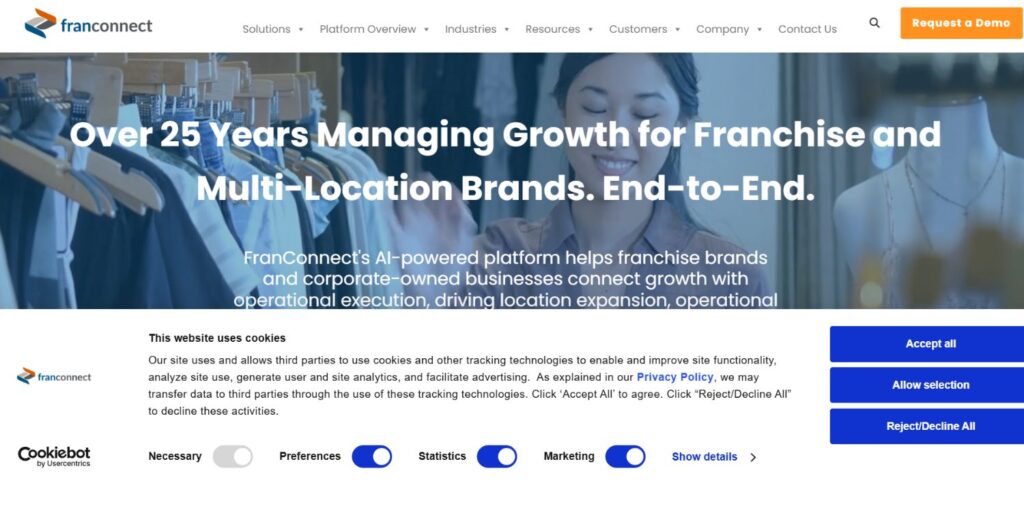
FrancConnect is an all-in-one and industry-best portal that serves franchise management solutions to businesses of any size. It has more than twenty years of expertise in offering powerful lead management, operations, training, and analytics tools. The site also integrates advanced Risk Management Software features, ensuring that franchises can monitor compliance and minimize potential business risks effectively.
It is especially well-positioned for small companies in search of professionalizing their franchise business with a scalable system that expands with the size of the network but does not lose a user-friendly interface and affordable price bracket.
Key Features:
- Lead and sales management
- Business and compliance management.
- Learning management system
- Forming of royalty automation.
Pros:
- Very extensive characteristics.
- Excellent customer support
- Industry-proven reliability
Cons:
- Steeper learning curve
- Higher price point
- May overwhelm startups
Website: https://www.franconnect.com
2. Jobber
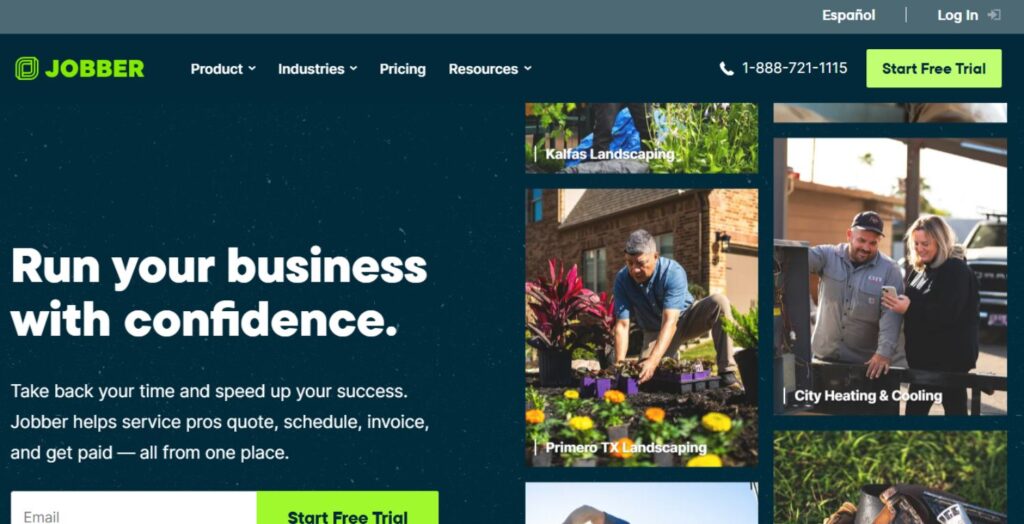
Jobber has become a dominant field service management platform that is highly versatile in terms of adapting to franchise business, in service-based small businesses such as cleaning, landscaping, plumbing, HVAC and home maintenance franchises. Jobber was originally aimed at individual service providers but can easily be scaled to a multi-location franchise business, providing all the necessary tools to organize schedules, dispatching, invoicing, customer management, and team coordination. This platform also has a GPS tracking and route optimization and thus assists service franchises to optimize their efficiency and minimize the time spent in traveling between job locations.
Key Features:
- Job scheduling and dispatch
- Mobile field management app
- Customer communication automation
- Invoicing and payment processing
Pros:
- Service franchise specialization
- Excellent mobile functionality
- Intuitive user interface
Cons:
- Limited corporate oversight features
- Not franchise-specific design
- Basic reporting capabilities
Website: https://www.jobber.com
3. ClickUp
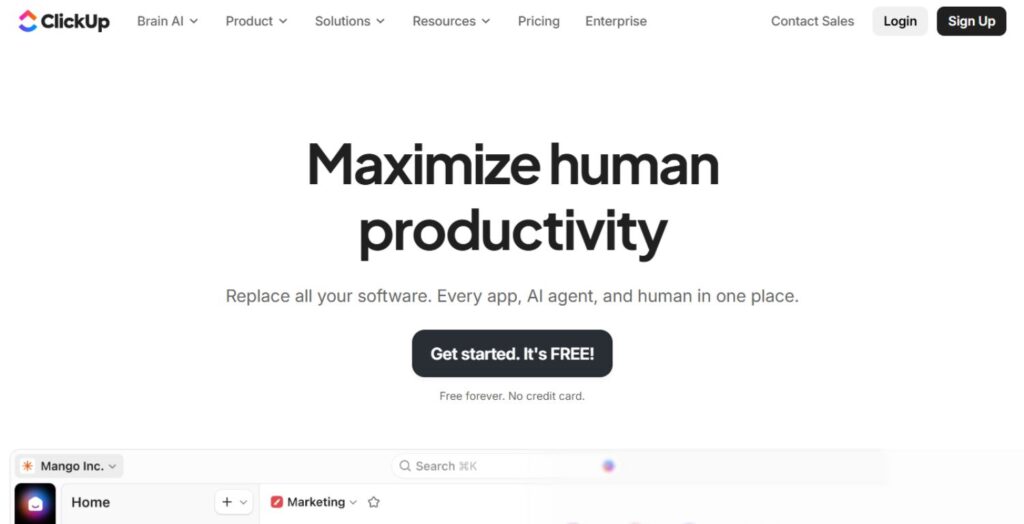
ClickUp is a disruptive franchise management solution because it provides an infinitely scalable work management platform that can be tailored by small business franchisors to suit their precise operation requirements. As opposed to the inflexible nature of purpose-built franchise software with strict structures,ClickUp offers a loose and reconfigurable framework of tasks, projects, documents, goals and dashboards that can be customized to handle anything, including franchisee onboarding, compliance monitoring, and marketing campaign orchestration. The template system of ClickUp will also be especially useful in the context of franchising, where franchisors can develop a standardized set of processes, checklists, and workflows, which can be recreated by franchisees in their own operation to provide operational consistency within the network.
Key Features:
- Workflow management that is customizable.
- Collaboration tools in paperwork.
- Goal tracking and dashboards.
- Expansive integration solutions.
Pros:
- Very adaptable and flexible.
- Affordable pricing tiers
- Outstanding teamwork characteristics.
Cons:
- Takes a considerable length of time to set up.
- High cost of learning curve at first.
- No templates of the franchise.
Website: https://www.clickup.com
4. SugarCRM
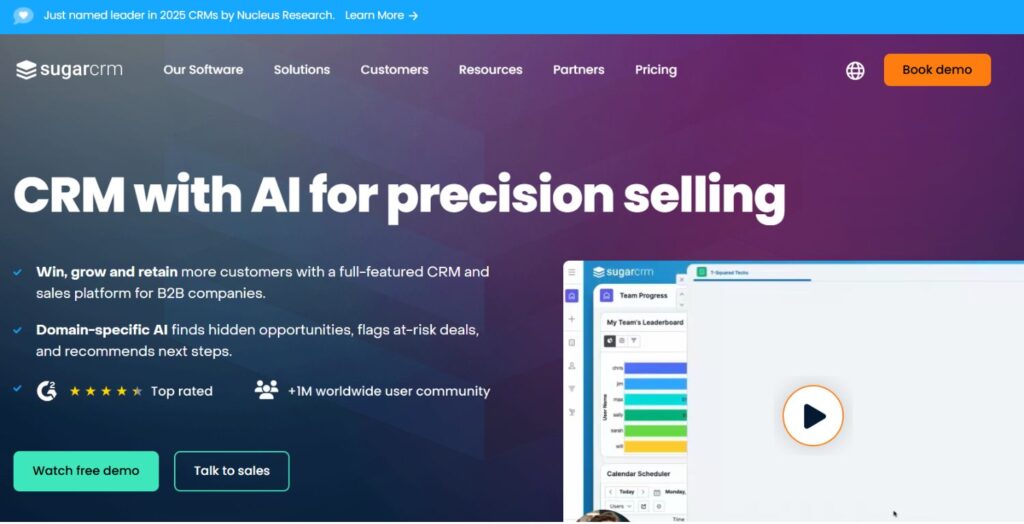
SugarCRM offers an enterprise level of CRM Software and customer relationship management solutions that are explicitly tailored to franchise activities, which is why it is an ideal solution to small businesses that are more interested in franchisee relations and information-based decisions.
The franchise-friendly nature of the platform enables the franchisors to have a single customer database and allow the franchise owners to have the right to access their local customer data, creating transparency without affecting data security. SugarCRM is also available in cloud deployment as well as on-premise deployment, allowing small business franchisors the flexibility to host and manage their data.
Key Features:
- CRM and lead management
- Ticketing of franchisee support.
- Marketing automation tools
- High-tech analytics and reporting.
Pros:
- Powerful CRM capabilities
- Elastic deployment choices.
- High level of customization.
Cons:
- Requires CRM expertise
- Increased complexity of implementation.
- Other add-ons: features.
Website: https://www.sugarcrm.com
5. Naranga
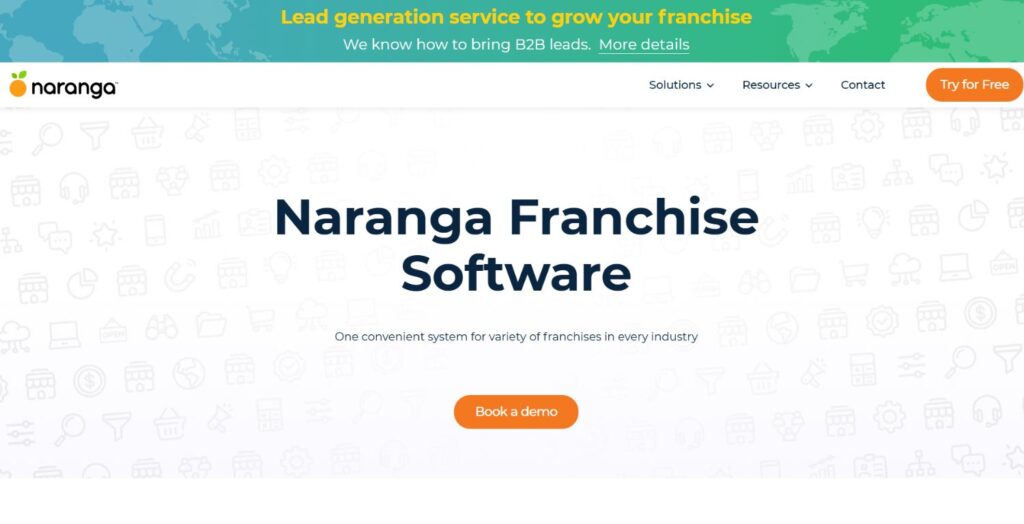
Naranga provides an up-to-date, e-based franchise management solution that is both advanced and user-friendly to small business franchise owners. The program has a modular design and it enables a company to purchase and install only the capabilities that it requires and therefore is economical to run a smaller business. Naranga is good at offering real-time visibility in franchised networks, allowing franchisees and franchisors to work together, and providing powerful tools of compliance management that do not add to the bureaucratic barrier in the day-to-day operations.
Key Features:
- Modular feature selection
- Immediate performance monitors.
- Toolkit: compliance management.
- Shared business communication platform.
Pros:
- Scalable architecture.
- Strong compliance features
- Modern user experience
Cons:
- Module costs accumulate
- Newer in marketplace
- Smaller support community
Website: https://www.naranga.com
6. Synergy Franchise Systems
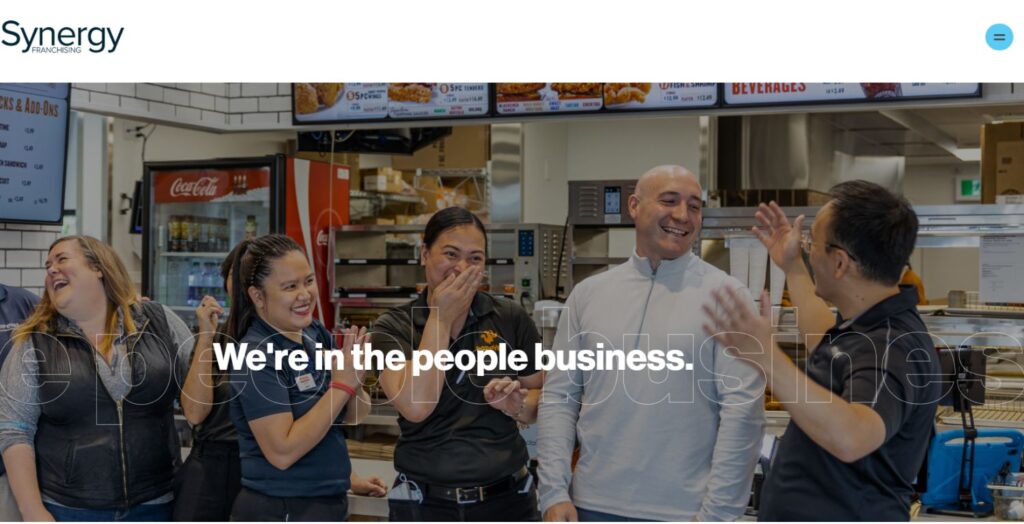
Synergy provides a single franchise management chain that underlines operational performance and best franchise management software for small business or mid-sized franchise systems. The platform contains in-depth operations management, training delivery, marketing coordination and financial tracking devices. Synergy is unique in that it revolves around the establishment of good relationships between franchisors and franchisees, which comes with transparent lines of communication, available knowledge base, and support ticketing where franchisees get response promptly whenever they are faced with difficulties.
Key Features:
- Operations manual hosting
- Training content delivery
- Support ticket system
- Financial reporting suite
Pros:
- Extensive operations are concerned.
- Strong training components
- Good franchisee support
Cons:
- Interface feels dated
- Setup requires effort
- Poor mobile capabilities.
Website: https://www.synergyfranchise.com
7. BrandWide
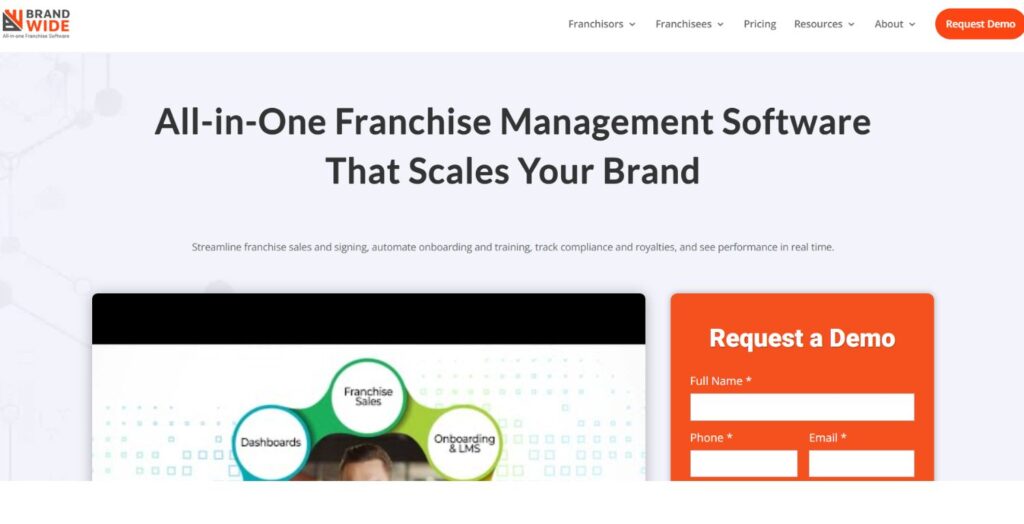
BrandWide is purpose-built franchise management software specifically designed to meet the specific operational issues of multi-location franchise businesses, and is the best franchise management software to use when small business franchisors need a multi-location specific franchise-focused capability. BrandWide, created by the veterans of the franchise industry, is aware of the subtle balance between centralized control and local autonomy, so it builds its platform to empower both franchisors and franchisees. The communication hub of BrandWide will gather all interactions between franchisees, such as announcement broadcasting, discussion forums, direct messaging, document sharing, and support tickets, so franchisees could use multiple channels to obtain information and seek support.
Key Features:
- Operations and compliance control.
- Learning management system
- Tracking of financial and royalty.
- Multi-channel communication centre.
Pros:
- Franchise-specific design
- Comprehensive feature set
- Strong compliance tools
Cons:
- Higher price point
- Needs implementation assistance.
- May has engulfed very small franchises.
Website: https://meetbrandwide.com/
8. Rallio
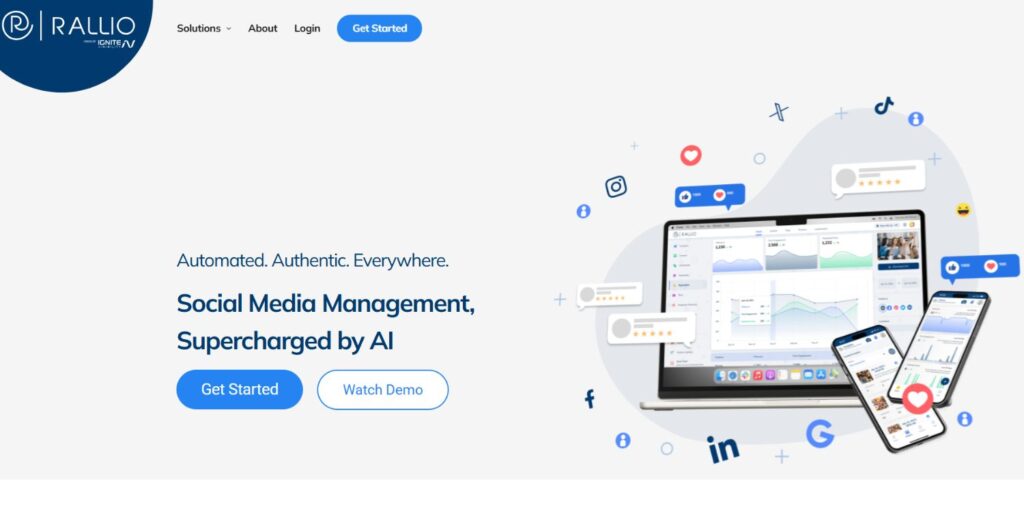
Rallio is a company that makes a very special choice and is partially interested in franchise social media management, as well as in local marketing coordination, which is a great complementary solution or primary option to brands when brand consistency is a priority. The platform allows franchisees to implement localized marketing; stay brand compliant, and has advanced social media schedulable, content libraries, and reputation management tools. With small franchise businesses on competitive markets where digital presence makes larger companies gain customer wins, Rallio systems offer specific features that other general franchise management software usually does not have.
Key Features:
- Social media management
- System of content distribution.
- Reputation checking software.
- Local marketing automation
Pros:
- Marketing-focused specialization
- Strong social features
- Brand compliance controls
Cons:
- Reduced operational characteristics.
- Best as complementary tool
- I need knowledge in marketing.
Website: https://www.rallio.com
9. Franchise360
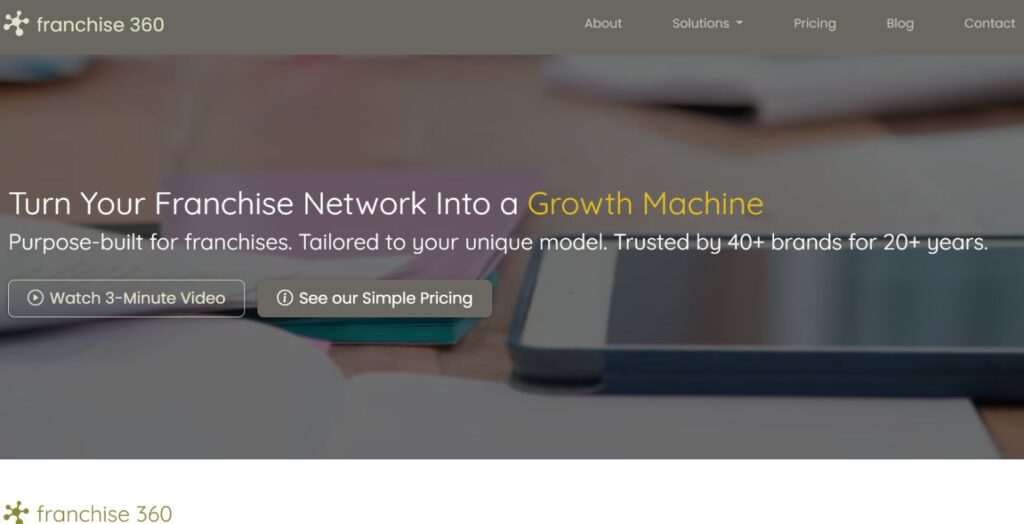
Franchise360 is an advanced but mobile platform that targets small and emerging franchise systems and focuses on the establishment of professional management practice since the first day. The software will address widely used franchise processes such as franchisee training, delivery, training, performance tracking, and the management of the territory. The difference that Franchise360 has is its support to implement a franchise and offering educational information, where first time franchisees begin to learn the best practices whilst the software is set up according to the business model and growth goals of the franchisee.
Key Features:
- Franchisee Onboarding Processes.
- Territory management system.
- Training module delivery
- Tools of performance benchmarking.
Pros:
- Included in the implementation support was
- Education resources availed.
- Franchise-focused design
Cons:
- Smaller market presence
- Fewer integration options
- Limited advanced features
Website: https://www.franchise360.com
10. ServiceM8 (for Service-Based Franchises)
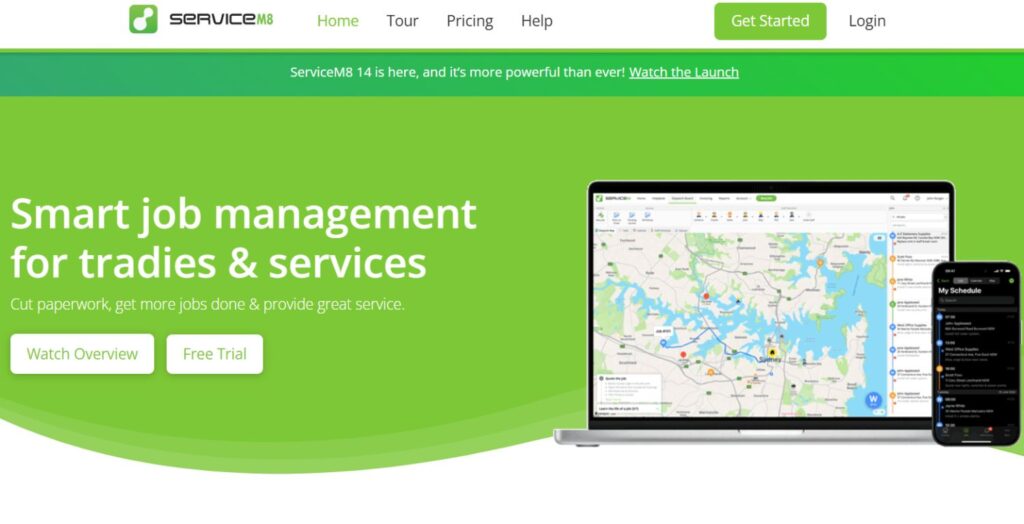
ServiceM8 is the best franchise management software for small businesses that are related to services such as cleaning, plumbing, electrical or maintenance. Although it is not purely franchise software only, its functionality in terms of job management, scheduling, and communication with customers can serve the franchise operations quite well. The platform allows control of the work of service delivery in several places operated by various franchisees centrally and provides individual operators with the means necessary to conduct their daily operations. In the case of service franchise models, ServiceM8 can provide the most efficient franchise management software in small business in terms of efficiency in the field operation.
Key Features:
- Job scheduling system
- Mobile field management
- Customer communication infrastructures.
- Invoicing and payments
Pros:
- The specialization of the service industry.
- Excellent mobile apps
- Affordable pricing tiers
Cons:
- Not design specific to franchises.
- Weak management of franchisees.
- Requires workarounds
Website: https://www.servicem8.com
How to Choose the Right Software for Your Franchise
- Project Your Budget and Growth Pattern: Review the existing costs, and growth rates as you expand the number of locations, and ask yourself which model of subscription, per-location fees and other one-time licensing would be more financially appropriate to your budget.
- Assess Ease of Use and Adoption: Find the most optimal franchise management software to small business that your franchisees will actually adopt by asking them to demo, test interfaces and use the technical sophistication of your network.
- Check Integration Capabilities: Make sure that the software fits perfectly into your current technology stack (accounting systems, POS platforms, and marketing tools) so that there is no separate silo of data and no duplication of entries.
- Review Support and Training Resources: Learn about onboarding support, continuing support, training materials, and user communities available since these resources greatly influence the successful implementation and long-term value.
- Request References and Trial Periods: Have people in related industries and franchise sizes verify about the product and use the free trial or pilot program to test the functionality of the product before agreeing to the long-term contracts.
Conclusion — Streamline, Scale & Simplify Your Franchise Operations
Choosing the best franchise management software for small business is a very important decision when it comes to the future of your franchise and its proper development. The appropriate platform enables the decentralized operations to become a centralized, streamlined system that enables both franchisors and franchisees to concentrate on the most valuable part of the business, and that is to create the best customer experiences and revenue generation.
As we have discussed in the rest of this guide, the current franchise management solutions exhibit very potent features which could only be enjoyed by an enterprise level brand, but at prices and complexity that a small business franchisor can now afford. It can be operations management, sales pipeline development, marketing coordination or financial tracking that you prioritize. There is a solution that is exactly what your needs are. Be prepared to carefully consider your options, use trial periods and engage key stakeholders in selection. With appropriate franchise management software integrated in 2026, you will be ready to expand your franchise in a scalable way, a better profitability, and sustainability in a more competitive market.
FAQs
What is the cost average of the best franchise management software for small business?
Small businesses usually pay between $100-500 a month to use franchise management software, but the cost would differ according to features, number of locations, and user licenses. Other platforms come with modular prices whereby you only pay what you utilize.
Is regular CRM software applicable as opposed to franchise management specific software?
Although CRM software is capable of performing certain tasks like communication and contact management, it does not have features that are specific to franchises such as royalty tracking, territory management, compliance monitoring and franchisee specific reporting which are very crucial in running franchise operations.
What would be the duration of time required to install franchise management software?
This is a 2-12 weekly period of implementation, based on the complexity of your platform, size of your franchise, and customization of the platform, as well as migrating the data to the new platform. The on-premise systems are normally slower in deployment compared to cloud-based solutions.
Does franchise management software apply to single unit franchises?
Majority of franchise administration software is aimed at franchisors who have numerous franchisees as opposed to proprietors of single-unit franchises. Single unit operators would normally be better served by conventional business management tools unless planning to grow very fast.
What are the security features that I expect in franchise management software?
Such fundamental security controls as data encryption (in-transit, at-rest), implemented role-based access controls, recurrent automatic backup, two-factor authentication, adherence to data protection regulations (GDPR, CCPA), and audits of sensitive activities are included.
.





